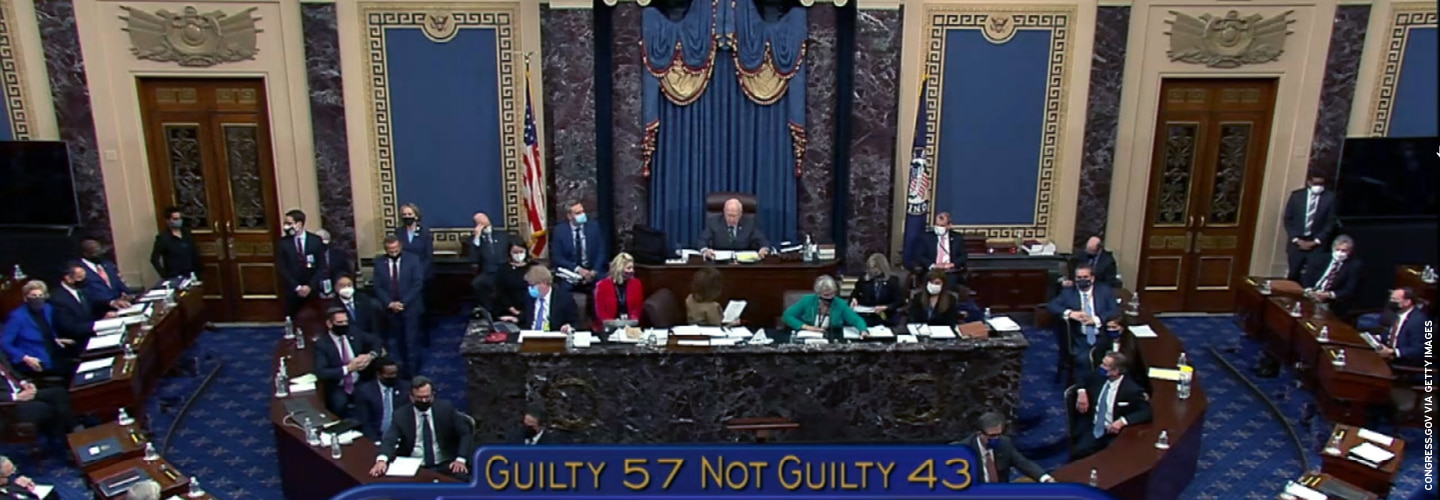On Saturday, February 13, the U.S. Senate voted to clear former president Donald Trump of the charge against him in his second impeachment trial. The Senate voted largely along party lines, with all 48 Democrats and 2 Independents—plus 7 Republicans—voting to convict Trump, and 43 Republicans voting to acquit him. For Trump to have been found guilty, at least 67 senators—two-thirds—would have had to vote to convict him. Here’s what you need to know to understand the situation.

Senators vote during former president Donald Trump’s second impeachment trial on February 13.
U.S. NEWS
Trump Cleared of the Charge Against Him in Second Impeachment Trial
The Senate has voted not to convict Trump for encouraging the violence that took place at the U.S. Capitol last month.
Why was Trump on trial in the first place?
Shawn Thew/EPA/Bloomberg via Getty Images
Trump addressing a crowd of his supporters in front of the White House on January 6, shortly before the Capitol riot
Last month, the U.S. House of Representatives voted to impeach Trump, meaning it officially charged him with a serious wrongdoing. According to the U.S. Constitution, a president who has been impeached must then stand trial in the Senate.
The House charged Trump with “inciting violence against the government of the United States.” Lawmakers said Trump encouraged the rioters who broke into the U.S. Capitol on January 6, smashing windows and stealing government property. Vice President Mike Pence and members of Congress, who were meeting at the Capitol to officially declare the winner of the 2020 presidential election, had to be evacuated for their safety.
Earlier in the day, Trump had given a speech at a rally in Washington, D.C., in which he claimed that the election was unfair and urged his supporters to go to the Capitol while lawmakers were meeting. He told his supporters, “If you don’t fight . . . you’re not going to have a country anymore.”
What happened during the trial?
During the trial, which began on February 9, nine Democratic lawmakers from the House of Representatives presented the case against Trump. The president’s personal lawyers defended him. The Senate acted as the jury, listening to the case and eventually voting on the charge.
House lawmakers spent two days laying out the case against Trump. They argued that Trump was responsible for encouraging the rioters who stormed the Capitol, endangering the lives of members of Congress, journalists, police officers, and other people. In addition to the president’s speech the day of the riot, lawmakers noted that Trump had spent the past few months falsely claiming that he won the election and that he was the victim of widespread voter fraud. (Officials have found no evidence of voter fraud.)
Trump’s lawyers, on the other hand, argued that the president cannot be held responsible for what his supporters do. They said the president’s words and actions, including the speech he delivered before the riot, is protected by the First Amendment to the U.S. Constitution.
Ultimately, fewer than 67 senators voted to convict Trump, so he was cleared of the charge against him.
Why did the trial take place even though Trump is no longer president?
The Framers of the Constitution created the impeachment process as a way to remove a president from office for significant wrongdoing. Trump’s term of office, however, ended on January 20, when Joe Biden was sworn in as the nation’s 46th president.
Still, members of Congress thought it was important to hold Trump accountable for his actions. They said it was crucial to send a clear message to Trump, future U.S. presidents, and other leaders that actions by a president to encourage violence will not be tolerated. Additionally, if at least 67 senators had chosen to convict Trump, the Senate could also have voted to bar him from ever holding federal office in the future. (Trump is said to be considering running for president in 2024.)
What happens next?
With the impeachment trial now over, lawmakers in both major political parties say they’re eager to turn their primary attention to providing relief to the millions of Americans affected by the Covid-19 pandemic and the economic devastation it has caused. Some political experts think that if lawmakers can pass major pandemic-relief legislation, they might be able to help unite the nation, which remains deeply divided.
